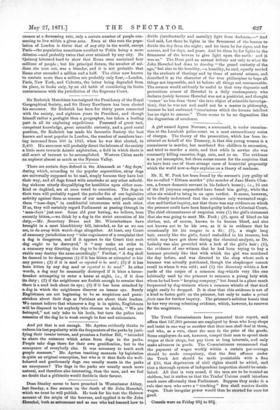Dean Stanley seems to have preached in Westminster Abbey, last
Sunday, a fine sermon on the death of Sir John Herschel, which we trust he will publish. He took for his text the Hebrew account of the origin of the heavens, and applied it to Sir John Herschel, both as astronomer and as one who had learned how to
divide (intellectually and morally) light from darkuess,—" And God said, Let there be lights in the firmament of the heaven to divide the day from the night ; and let them be for signs, and for seasons, and for days, and years. And let them be for lights in the firmament of the heaven to give light upon the earth : and it was so." The Dean paid an earnest tribute not only to what Sir John Herschel had done to develop "the grand curiosity of the age," but also to his humility,—a humility, he said, equally needed by the students of theology and by those of natural science, and described it as the character of the true philosopher to hope all things not impossible, and to believe all things not unreasonable. The sermon would evidently be useful to that very dogmatic and pretentious censor of Herschel in a daily contemporary who declares (solely because Herschel was not a positivist, sod thought 'causes' no less than 'laws' the true object of scientific investiga- tion), that he was not and could not be a master in philosophy, because he had embraced "conclusions which the human intellect has no right to assume." There seems to be no dogmatism like the dogmatism of nescience.


































 Previous page
Previous page